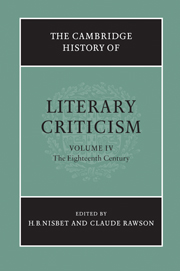Book contents
- Frontmatter
- INTRODUCTION: CRITICISM AND TRADITION
- GENRES
- LANGUAGE AND STYLE
- THEMES AND MOVEMENTS
- 18 Sensibility and literary criticism
- 19 Women and literary criticism
- 20 Primitivism
- 21 Medieval revival and the Gothic
- 22 Voltaire, Diderot, Rousseau and the Encyclopédie
- 23 German literary theory from Gottsched to Goethe
- 24 The Scottish Enlightenment
- 25 Canons and canon formation
- LITERATURE AND OTHER DISCIPLINES
- Bibliography
- Index
- References
21 - Medieval revival and the Gothic
from THEMES AND MOVEMENTS
Published online by Cambridge University Press: 28 March 2008
- Frontmatter
- INTRODUCTION: CRITICISM AND TRADITION
- GENRES
- LANGUAGE AND STYLE
- THEMES AND MOVEMENTS
- 18 Sensibility and literary criticism
- 19 Women and literary criticism
- 20 Primitivism
- 21 Medieval revival and the Gothic
- 22 Voltaire, Diderot, Rousseau and the Encyclopédie
- 23 German literary theory from Gottsched to Goethe
- 24 The Scottish Enlightenment
- 25 Canons and canon formation
- LITERATURE AND OTHER DISCIPLINES
- Bibliography
- Index
- References
Summary
Criticism of Gothic fiction in English dates from 1765, when the first reviews of Horace Walpole's pioneering Gothic novel, The Castle of Otranto, were published. The medieval revival, which gave Walpole the impetus to write his pseudo-medieval novel, cannot be so precisely dated. A new reverence, however, towards medieval literature was displayed in Richard Hurd's impressionistic Letters on Chivalry and Romance (1762), and in the revised edition of Thomas Warton's Observations on the Fairy Queen, published in the same year. While this essay is concerned primarily with the work of later eighteenth-century English critics writing on medieval literature, on contemporary forgers of the medieval such as Macpherson and Chatterton, and on Gothic fiction and drama, a brief account of the attitudes toward medieval literature prevalent between the Restoration and the 1760s will provide a necessary background for subsequent developments.
In the preface to his translation of Rapin's Réflexions sur la poëtique d'Aristote (1674), Thomas Rymer devotes a paragraph to the Middle Ages, which he describes as ‘the Age of Tales, Ballads, and Roundelays’, and as such finds unworthy of critical consideration. Rymer also passes over Chaucer, ‘in whose time our Language … was not capable of any Heroick Character’ (Critical Works, p. 5). In A Short View of Tragedy (1693), Rymer was more explicit. For those who wrote before Chaucer, he still had only scorn; they ‘made an heavy pudder, and are always miserably put to't for a word to clink’. Even though Chaucer himself is given credit for mingling Provençal, French and Latin vocabulary with English, ‘our language retain'd something of the churl; something of the Stiff and Gothish did stick upon it, till long after Chaucer’ (Critical Works, pp. 126–7).
- Type
- Chapter
- Information
- The Cambridge History of Literary Criticism , pp. 470 - 488Publisher: Cambridge University PressPrint publication year: 1997
References
- 2
- Cited by

